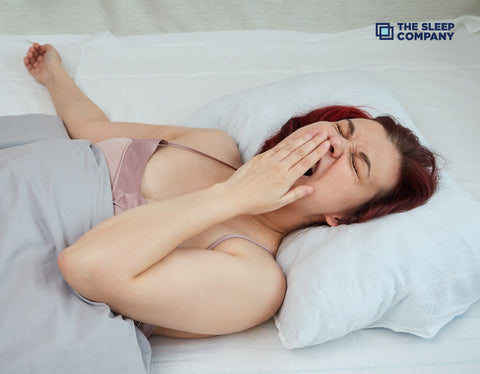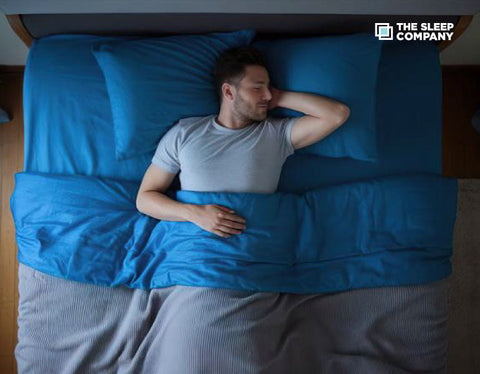My Cart

Can Fasting Affect your Sleep Quality?

The Hindu holiday of Janmashtami will be observed on August 18th. The birth of lord Krishna is annually observed across the nation with great fervour and enthusiasm. The entire day, up until the hour of Lord Krishna’s birth at midnight, people fast and devote time to worshipping him.
Fasting is a significant Vedic ritual that followers observe on Lord Krishna’s birthday. Fasting on Krishna Janmashtami is thought to have far more benefits than any other fasting. Everyone who observes the Janmashtami fast benefits spiritually and physically. Fasting has a deeper meaning since it draws the soul nearer to the Supreme Being.
While fasting is followed as a sign of devotion to the Almighty and a test of our self-control, one should not go sleepless during fasting. In some religions, fasting is either eating exclusively during specific hours or forgoing certain foods that interfere with our ability to go to sleep. In Ramadan, one can only eat before sunrise and after sunset, and during lent, when Christians fast, abstinence is once again crucial. During Navratri, Shivratri, and Ekadashi, one must give up flour and grains. It’s noteworthy to notice that any modification to our food schedule or eating behaviors directly affects how we sleep.
The impact of fasting on sleep
Enhance the quality of Sleep
According to research, fasting may enhance the quality of your sleep by strengthening your circadian rhythms. Your circadian rhythms control a wide range of biological processes, including your metabolism, hunger, and sleep-wake cycle. Although food is a potent secondary circadian zeitgeber, or “time trigger,” your circadian rhythm mostly depends on sunlight to control these processes. Maintaining regular mealtimes, like one does when fasting, helps support your body’s natural circadian rhythms.
More Energy & Focus
People who fast may also feel more energized and focused. Orexin-A, a neurotransmitter linked to alertness, is produced more abundantly when one fast. People who fast specifically have higher orexin-A levels during the day and lower levels at night, which makes them feel more awake throughout the day and sleep better.
Can Fasting cause Insomnia?
Although fasting seems to enhance the quality of your sleep, it can also affect your sleep depending on when you eat. People who consume irregular meals may have trouble sleeping. This is especially true if they eat late at night because doing so can cause the body to warm up, the reverse of what happens when we sleep. Heavy meals eaten too soon to bedtime may upset your stomach and make it difficult for you to fall asleep, which will disrupt your sleep and alter how rested you feel when you wake up.
How to Sleep Better During Fasting? Sleep Tips –

A regular eating pattern may enhance the quality of your sleep. You could get even greater rest while fasting if you incorporate a few healthy sleeping techniques.
If your stomach is growling, it could be more difficult to fall asleep. Cortisol, a stress hormone, is released when you’re hungry, which might reduce the quality of your sleep. Plan to eat your final meal for three hours or more before going to bed. You won’t go to bed hungry but your digestion won’t keep you up at night either.
Keep hydrated
Dehydration before bed can result in sleep that is less restful or of lower quality15. By increasing your water intake during the day, you may experience fewer hunger pangs16 and have an easier time falling asleep at night.
Avoid going to bed hungry
Be cautious when consuming alcohol and coffee. Although caffeine17 may make you feel less hungry, it makes it difficult to sleep. In addition to having a detrimental impact on your metabolism and leading to dietary deficiencies, alcohol18 disturbs sleep.
Take a Nap
Try to take a nap if you have a personal cabin at work or at home to keep yourself refreshed. Self-control is necessary for all types of fasting. It has been demonstrated that napping can rejuvenate our cells, lower our risk of heart attack, soothe the nervous system, and increase productivity. The half-hour could end up being your best chance to stay alive and well. If you’re napping at home then ensure that you’re sleeping on a supportive mattress. There are plenty of options available to buy mattresses online.
Choose to have nutritious foods
Avoid meals like junk food that are high in sugar and empty calories. You’ll find it simpler to maintain your intermittent fasting plan if you stick to eating wholesome, nutrient-dense foods. Choose complete foods, fresh produce, lean proteins, and healthy fats. Additionally, items that are healthy for your nutrition are healthy for your sleep.
Detox Your Body & Mind
Hunger patterns and sleep are connected. Because of the increased brain activity caused by intermittent fasting, it can be difficult to fall asleep. Therefore, it is even more crucial to establish a sleep schedule and limit your use of technology during this time. Get away from your normal addictive routines and spend more time in nature. Every day, take a stroll in a park that is lush and green. Become accustomed to your new schedule and maintain it. Let this be a time for introspection and cleansing. Your mind should be clearer and you should be able to sleep deeper as your body feels more detoxified. If you can, get a massage to help with the detox and to help your muscles relax. Have a green tea or chamomile tea to calm you just before bedtime.
You could find it easier to fall asleep on a regular schedule if you eat at regular intervals. Before starting an intermittent fasting regimen, especially if you’re expecting a child or have a medical problem, talk to your doctor.


































































